The Philippines and Japan have formed a strong strategic partnership, driven by their shared interests in maintaining regional stability and a rules-based order.
Their relationship has spanned over six decades, evolving from post-war reconciliation to comprehensive cooperation in defense, economics, and maritime security.
Key milestones include the signing of the Reciprocal Access Agreement (RAA), which enhances joint military activities, and Japan's Official Security Assistance (OSA) grant aid for a coastal radar system.
Japan remains a crucial partner in Philippine development, particularly in infrastructure development and humanitarian assistance.
The two nations are working together to address common threats, foster economic growth, and promote regional peace and stability.
Historical Foundations of the Partnership
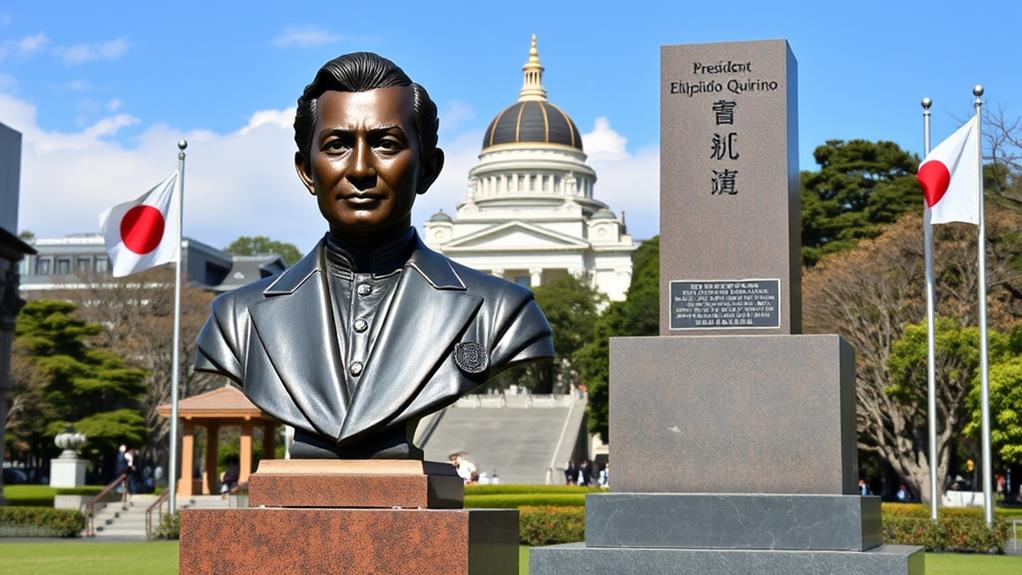
The Philippines and Japan: A Strategic Partnership
Historical Foundations of the Partnership
The Philippines-Japan strategic partnership has its roots in a complex relationship that spans over a century. This relationship began in the late 19th century, when Emperor Meiji sent an economic mission to the Philippines in 1875 to resume normal trade relations.
Despite past conflicts, such as the Bataan Death March, and shared experiences during World War II, the two nations have fostered a deeper understanding and reconciliation.
The modern era of cooperation began to take shape after World War II. Japan's official development assistance (ODA) played a crucial role in the Philippines' economic development and domestic stability.
This assistance fostered positive attitudes towards Japan among Filipinos, particularly when Japan became one of the first countries to support the new Philippine government following the People Power Revolution in 1986.
Japan has remained a significant source of development funds, trade, and investment for the Philippines. The relationship has been reinforced through numerous high-level visits and agreements, including the 2015 Joint Declaration, which outlined shared goals of ensuring peace, stability, and economic growth in the region.
These historical interactions have laid the groundwork for the robust strategic partnership today.
Shared Threat Perceptions and Security
Strengthening Strategic Partnership
The Philippines and Japan have bolstered their strategic partnership to address shared security concerns, driven by a common perception of threats, particularly from a rising and assertive China.
Shared Security Concerns and Initiatives
Maritime Security: Both countries are concerned about Chinese aggression in the South China Sea. To address this, they've established a Reciprocal Access Agreement (RAA) for joint military activities, including maritime drills and enhanced interoperability.
Regional Stability: The potential conflict over Taiwan is a shared concern. To mitigate this, the Philippines and Japan cooperate on intelligence sharing, joint exercises, and defense posture coordination in vital military facilities like Batanes and Okinawa.
Economic Security: The dependence on China's Belt and Road Initiative is a shared economic security concern. To reduce this reliance, Japan provides Official Security Assistance (OSA) for defense equipment and infrastructure projects.
These collaborative efforts demonstrate the deepening security ties between the Philippines and Japan, aimed at maintaining stability and peace in the Indo-Pacific region.
The partnership is crucial for enhancing the capabilities of both countries to counter emerging challenges effectively.
Enhancing Maritime Cooperation
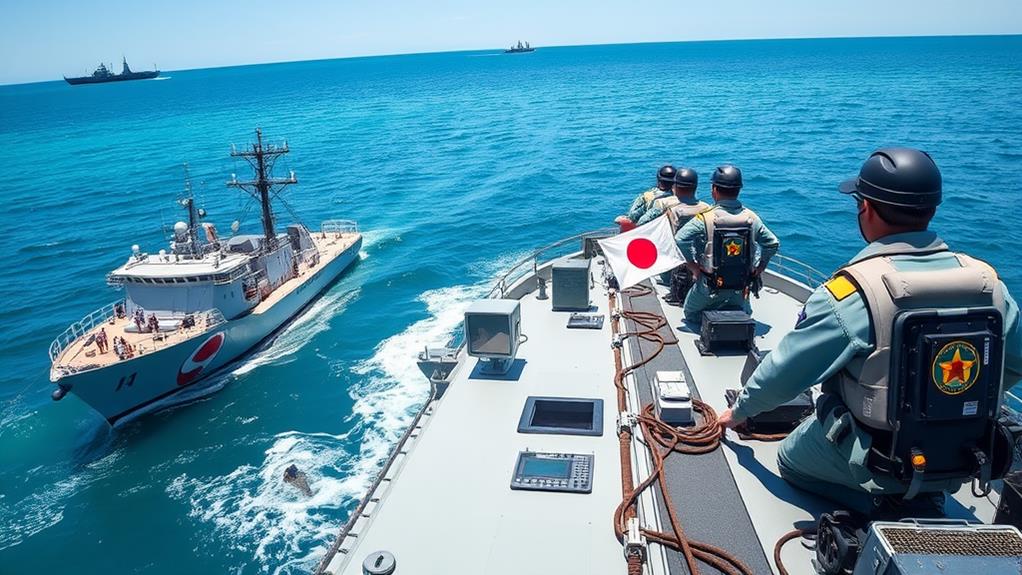
The Philippines and Japan are strengthening their maritime cooperation to address shared security concerns in the South and East China Seas.
Their cooperation is driven by China's increasing assertiveness in the region. To enhance the Philippine navy's maritime domain awareness capabilities, Japan has provided Official Security Assistance (OSA) grant aid, which includes a coastal radar system. This system will improve the Philippines' ability to monitor and secure its maritime territories.
The region's strategic importance is highlighted by the need for robust disaster response capabilities. The 1991 eruption of Mount Pinatubo, which reshaped local landscapes, emphasizes the necessity for effective emergency preparedness.
The Reciprocal Access Agreement (RAA) between the Philippines and Japan has further strengthened their maritime cooperation. The RAA enables the Armed Forces of the Philippines (AFP) and the Japanese Self Defence Forces (JSDF) to engage in extensive joint military activities, including large-scale drills and disaster response operations.
This agreement also facilitates the transfer and exchange of sophisticated weapons systems, aiding the Philippines in its maritime modernization efforts.
These initiatives demonstrate both nations' commitment to maintaining a free and open Indo-Pacific. They reflect their adherence to a rules-based order and their determination to counter potential security threats in the region.
Economic Development and ODA
Japan's economic engagement with the Philippines plays a vital role in the country's development, complementing their robust security cooperation. This partnership spans various sectors, including infrastructure development, renewable energy, humanitarian assistance, and disaster response.
Japan has been a major partner for the Philippines for decades, providing significant support in shaping the country's post-war reconstruction and ongoing development.
Japan's Official Development Assistance (ODA) has been instrumental in the Philippines' development, focusing on key areas such as education, human resource development, public health, and agricultural system enhancement.
The economic partnership between the two nations is mutually beneficial, with Japan being the top source of foreign direct investments in the Philippines, particularly in the first half of 2023.
Major infrastructure megaprojects under the Philippine government's "Build Better More" (BBM) scheme are funded by Japan, highlighting the deepening economic ties. These investments not only boost the Philippine economy but also contribute to regional economic growth, as both countries aim to maintain a free and open Indo-Pacific.
The collaboration in economic development further solidifies the strategic partnership, enabling both countries to achieve shared goals of peace, stability, and prosperity in the region.
This cooperation underscores their commitment to multilateralism and the rules-based international order, fostering a stable and prosperous future for their peoples.
Infrastructure Investments and Growth
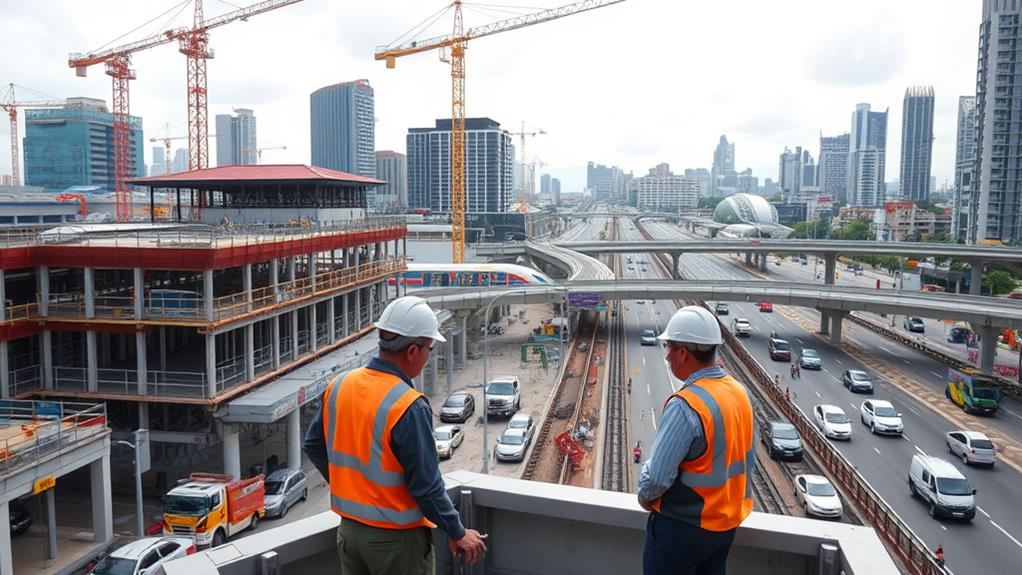
Infrastructure investments are a crucial aspect of the Philippines-Japan strategic partnership, driving economic growth and enhancing regional connectivity.
The Luzon Economic Corridor is a prime example of this collaboration, aiming to support connectivity among key economic hubs in the Philippines, including Subic Bay, Clark, Manila, and Batangas. This initiative will invest in high-impact projects such as rail, port modernization, clean energy, and semiconductor supply chains.
Japan's contribution is significant, with investments expected to generate up to $100 billion over the next decade. These investments won't only boost the Philippines' infrastructure but also stimulate economic growth in various sectors.
The corridor project is part of the U.S.-initiated Partnership for Global Infrastructure and Investment (PGI), highlighting the trilateral cooperation between the Philippines, Japan, and the United States.
Japan has been a long-standing partner in the Philippines' economic development, providing substantial Official Development Assistance (ODA) and private sector investments.
For instance, Japan's aid includes the donation of ships to the Philippine Coast Guard and the construction of patrol boats, further enhancing maritime security and stability in the region.
These investments underscore the deepening strategic and economic ties between the Philippines and Japan.
Joint Military Activities and RAA
The Philippines and Japan Boost Military Cooperation
The Philippines and Japan have significantly increased their joint military activities, deepening their strategic partnership. This escalation is marked by several key developments, including the signing of the Reciprocal Access Agreement (RAA) and the enhancement of bilateral defense cooperation.
Key Developments in Military Cooperation
The RAA establishes procedures for cooperative activities and defines the legal status for visiting forces.
Joint military exercises include large-scale drills focused on interoperability and joint response to disasters and conflicts.
The transfer of weapons systems facilitates the exchange of sophisticated systems, aiding Philippine maritime force modernization.
Integrated deterrence supports the US's strategy against potential Chinese aggression, particularly regarding Taiwan.
Importance of Joint Activities
These joint activities are crucial for managing intensifying great power competition and preparing for contingencies in the region.
The RAA enables the Armed Forces of the Philippines (AFP) and the Japanese Self-Defense Forces (JSDF) to expand their military cooperation, enhancing their readiness and interoperability.
Strategic Importance
The geographical proximity and shared security concerns of both countries, especially in the context of the South China Sea disputes and potential threats to Taiwan, highlight the strategic importance of these activities.
This strengthened military cooperation reinforces the commitment of both nations to a rules-based international order and their shared vision for a peaceful and stable Indo-Pacific region.
Disaster Response and Humanitarian Aid
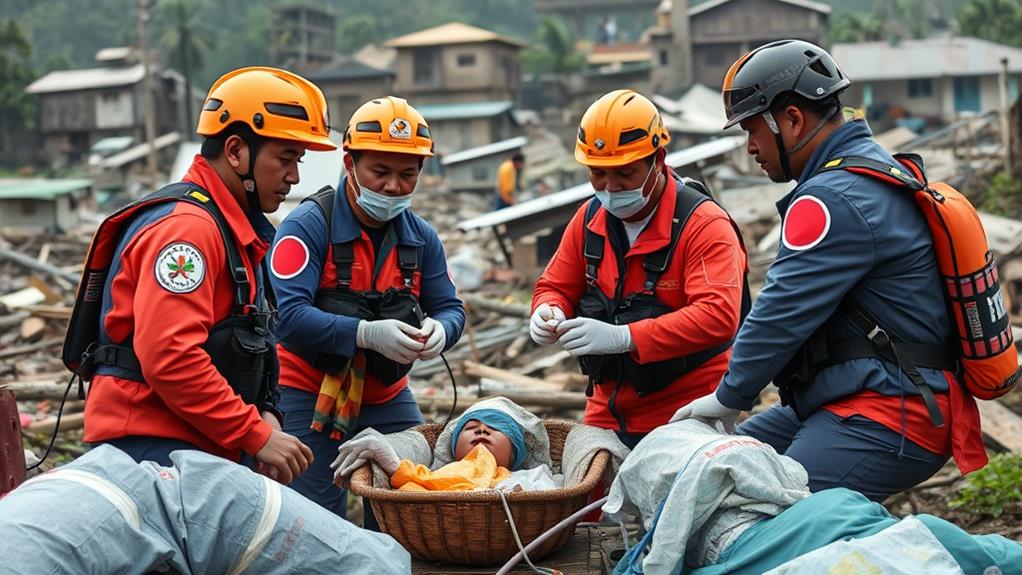
Disaster Response and Humanitarian Aid: A Cornerstone of Philippines-Japan Strategic Partnership
The Philippines and Japan, both prone to natural disasters due to their geography, have strengthened their cooperation in humanitarian assistance and disaster relief (HA/DR) efforts. This partnership is crucial, as both nations recognize the importance of collective resilience in the face of earthquakes, typhoons, and other severe weather events.
Key Initiatives and Activities
Enhancing Disaster Response Capabilities through Joint Training Exercises
The Philippines and Japan have conducted joint HA/DR training exercises, such as the one held at the Mandirigtas Training Area in Fort Bonifacio. This five-day activity brought together the Japan Ground Self-Defense Force (JGSDF) and the Philippine Army to enhance their capabilities in disaster response.
Provision of Critical Disaster Reduction Equipment
Japan has provided significant disaster reduction equipment to the Armed Forces of the Philippines (AFP) through a non-project grant aid. This equipment includes lifesaving tools like electric hydraulics, cutters, and search sound detectors.
Trilateral Cooperation for Regional Preparedness
The U.S., Japan, and the Philippines have engaged in a trilateral HA/DR initiative, which includes workshops, trainings, and policy forums to share best practices and strengthen regional preparedness.
Future Cooperation Plans for Enhanced Readiness
The three nations are launching a trilateral HA/DR exercise, aiming to enhance their readiness and interoperability in response to disasters. This initiative could be integrated into larger activities like the Balikatan 2025 exercise.
Promoting Rules-Based Order
The Philippines and Japan Promote a Rules-Based Order
The Philippines and Japan are committed to promoting a rules-based order in the Indo-Pacific region, rooted in their shared values of peace, stability, and prosperity.
This commitment is essential for addressing emerging challenges effectively.
Through ASEAN-led mechanisms such as the ASEAN Regional Forum and the East Asia Summit, the Philippines and Japan contribute to regional peace and security.
They engage in multi-faceted dialogue relations between ASEAN and Japan, focusing on cooperation in non-proliferation, disarmament, and the peaceful settlement of disputes.
Their strategic partnership aims to advocate for the rights of all nations, promote a free and open Indo-Pacific, and ensure international institutions reflect the evolving geopolitical landscape.
To achieve this, they strengthen international institutions, reform them to maintain relevance, and support a more inclusive and representative global order.
How Do the Philippines’ Relationships with China and Japan Differ in terms of Strategic Partnerships?
When it comes to strategic partnerships, the philippines and china economic ties are characterized by a focus on infrastructure and investment, while the relationships with Japan are more influenced by security and defense cooperation. The differing priorities in these partnerships reflect the diverse strategic interests of the Philippines in the region.
Regional Peace and Stability Efforts
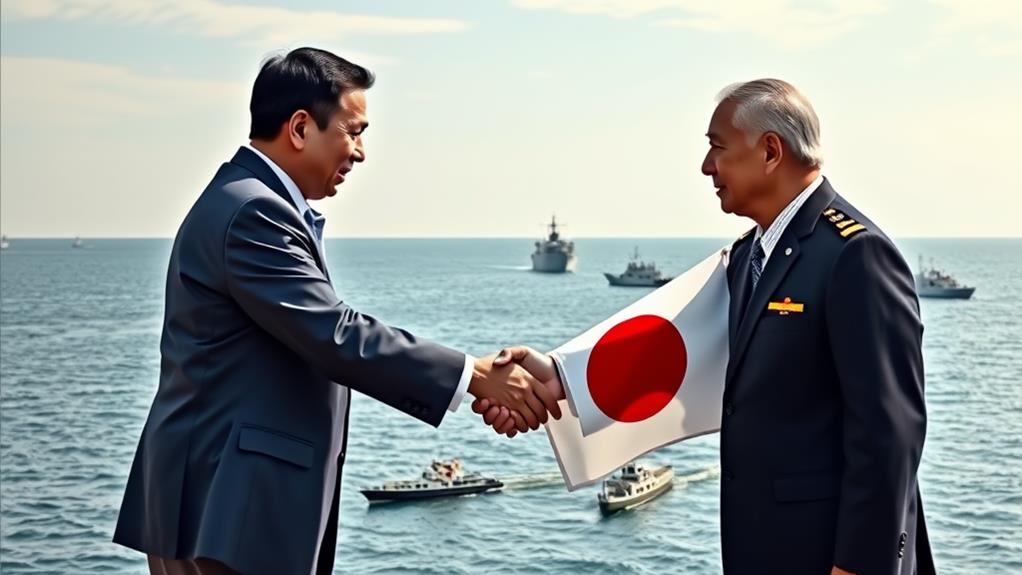
Regional Peace and Stability Efforts
The Philippines and Japan have been actively engaging in various cooperative efforts to maintain regional peace and stability. These efforts are driven by their shared commitment to a rules-based international order and their concern over the rising assertiveness of China in the South and East China seas.
Joint Military Drills
The Philippines and Japan have signed a Reciprocal Access Agreement (RAA) that enables the Armed Forces of the Philippines (AFP) and the Japanese Self-Defence Forces (JSDF) to conduct large-scale joint military drills. These drills focus on enhancing interoperability and preparing for contingencies, including disasters and armed conflicts.
Strategic Dialogue
Regular high-level meetings between Philippine President Ferdinand Marcos Jr. and Japanese Prime Minister Fumio Kishida have accelerated the positive trajectory of their relationship. These meetings emphasize the importance of strategic cooperation in maintaining regional peace.
Infrastructure and Economic Cooperation
Japan has been a significant contributor to the Philippines' infrastructure development, including funding major projects under the Build Better More (BBM) scheme. This cooperation strengthens economic ties and supports regional stability.
Multi-Layered Security Initiatives
Both countries participate in ASEAN-led mechanisms like the ASEAN Regional Forum and the East Asia Summit.
Additionally, Japan's Free and Open Indo-Pacific (FOIP) strategy aligns with the Philippines' interests in preserving regional peace and security.
These collaborative efforts demonstrate the robust nature of the Philippines-Japan strategic partnership, aimed at ensuring peace and stability in the Indo-Pacific region.
Future Directions and Cooperation Areas
Future Directions and Cooperation Areas
The Philippines and Japan are strengthening their strategic partnership by focusing on key areas of cooperation. These areas demonstrate their commitment to enhancing bilateral ties and addressing regional challenges.
Future Cooperation Areas
Economic Development: The Philippines and Japan will cooperate on infrastructure projects, such as Japan's support for the Metro Manila Subway Project and MRT Line 3 Rehabilitation.
Security Cooperation: Progress is being made on the Japan-Philippines Reciprocal Access Agreement (RAA) and the provision of defense technology and equipment.
Cultural Exchanges: People-to-people exchanges will be increased, featuring Japanese anime and manga popularity and Filipino nurses and caregivers in Japan.
Maritime Security: Enhanced cooperation will focus on maritime domain awareness, capacity-building, and protection of freedom of navigation.
Regional Stability: The partnership will collaborate in ASEAN-led mechanisms and engage in trilateral cooperation with the United States to maintain regional peace and stability.
These cooperation areas reflect the deepening relationship between the Philippines and Japan, driven by shared interests in regional security, economic prosperity, and cultural exchanges.
Questions and Answers
How Does the Partnership Impact Local Communities in the Philippines?
The partnership between the Philippines and Japan has a profound impact on local communities.
This partnership enhances infrastructure, education, and healthcare in the Philippines.
Japan's investments in key sectors, such as infrastructure development, renewable energy, and public health, have contributed to the Philippines' post-war reconstruction and ongoing development.
For example, Japan's support in disaster response and humanitarian assistance has improved the livelihoods of thousands of people in coastal communities.
This support has fostered greater resilience and stability in these communities.
What Role Do Cultural Exchanges Play in the Japan-Philippines Relationship?
Cultural exchanges are essential in strengthening the Japan-Philippines relationship. These exchanges help deepen mutual understanding and respect between the two nations.
For instance, the "Forum on the Role of Filipinologists and Philippine Studies" in Tokyo showcases the contributions of scholars and promotes intercultural dialogue. This initiative helps bridge cultural gaps and challenges stereotypes, ultimately fostering strong bilateral ties.
Such efforts reflect a commitment to mutual growth and resilience in the Japan-Philippines relationship.
How Are Environmental Concerns Addressed in Joint Development Projects?
In joint development projects, environmental concerns are addressed through various initiatives.
Japan and the Philippines are working together to reduce greenhouse gas emissions by developing carbon credits from agricultural projects. For instance, they're improving water management in rice paddy fields, which reduces emissions.
Infrastructure projects are also focused on resilience against natural disasters and climate change.
These projects include flood control measures and the implementation of clean energy technologies.
What Are the Implications for Other Southeast Asian Countries?
The Japan-Philippines joint development projects set a precedent for regional cooperation on infrastructure and climate initiatives in Southeast Asia. These collaborations can inspire similar trilateral partnerships in other countries, promoting resilient supply chains, clean energy transitions, and adherence to international climate commitments.
For instance, Japan's investment in the Philippines' renewable energy sector can be replicated in other countries, such as Indonesia or Vietnam, to reduce their reliance on fossil fuels.
However, Japan's continued investment in fossil fuels cautions other countries to carefully balance their energy strategies to align with global climate goals. This means that countries must weigh the benefits of partnering with Japan against the need to reduce greenhouse gas emissions and transition to cleaner energy sources.
What Are the Potential Long-Term Economic Benefits for Japan?
Japan's economy is poised for significant long-term benefits as it shifts away from deflation and towards steady growth. This transition is driven by increased nominal GDP growth, wage hikes, and improved corporate governance, which create a positive economic cycle.
Enhanced productivity is another key factor contributing to Japan's economic growth. This is achieved through better resource allocation, which ensures that resources are utilized efficiently.
Additionally, incentives for domestic production of sensitive technology encourage innovation and self-sufficiency.
Structural reforms and monetary policies are also in place to sustain growth and improve fiscal balances, making Japan an attractive destination for investors.